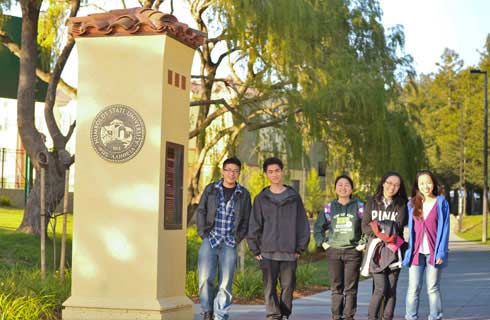Doctor of Philosophy in Arid Land Resource Sciences

学历文凭
Ph.D.

专业院系

开学时间

课程时长

课程学费

国际学生入学条件
Graduate Records Examination scores no more than five years old.
Proof of English proficiency is required for any international applicant born in a country where English is not the official language.
Acceptable English Proficiency Credentials can be found at:
https://grad.arizona.edu/admissions/requirements/international-applicants#english-proficiency
A list of publications and special papers (whether published or not). Reprints of journal articles are helpful but not necessary.
A minimum of three letters of reference. Letters should be from academic advisors as well as from professional supervisors.
A curriculum vitae, giving name, date and place of birth, resume of professional work with dates of employment and identification of all previous and present employers, membership in professional organizations, academic awards, professional honors, and any other pertinent information that may be useful to the committee in evaluating your qualifications for the degree program.
A brief statement, submitted separately or as part of your curriculum vitae, setting forth your long-range professional plans, such as the type of work you plan to pursue upon completion of the doctoral program.
A proposed graduate program, which should include two basic areas:
While not necessary, you may list specific courses by title and number. A general statement showing the relationship of various disciplines within your program is sufficient.
A brief description of the type of research you plan to undertake for your dissertation.
Applicants should specify one or more faculty members with whom they may wish to work. Applicants may learn more about the interests and research programs of ALRS faculty by (1) consulting the ALRS website (2) consulting the home pages of the faculty members' home departments, or (3) contacting faculty members directly (e-mail addresses provided on the ALRS website). Applicants who have contacted potential mentors are more likely to be admitted to the program, while otherwise well-qualified applicants may not be accepted if there is no mentor to match the applicant's stated interests.
Standardized Tests
Required test(s):
Required GRE Subject tests: general test only (No scores more than 5 years old)
Minimum GRE Verbal: 130-170, in 1 point increments
Minimum GRE Quantitative: 130-170, in 1 point increments
Minumum GRE Written: 0-6, in half point increments
Minimum MAT:
Minimum TOEFL: 79 internet based (IBT) 550 paper based (PB) required for international students or
Minimum IELTS: 7 (no subject area below a 6) for international students
Minimum Pearson PTE Academic
IDP—雅思考试联合主办方

雅思考试总分
7.0
- 雅思总分:7
- 托福网考总分:79
- 托福笔试总分:550
- 其他语言考试:Minimum Minimum CEPT: 110 on Full Academic test for international students
CRICOS代码:
申请截止日期: 请与IDP联系 以获取详细信息。
课程简介
相关申请
 预科
预科 奖学金
奖学金 实习机会
实习机会 在校学习
在校学习 跨境学习
跨境学习 校园授课-线上开始
校园授课-线上开始 在线/远程学习
在线/远程学习
开学时间&学费
学费信息仅供参考,请与IDP联系以获取详细信息
| 开学时间 | 时长 | 学费 | 地点 |
|---|---|---|---|
| 暂无 | 暂无 | 暂无 | 暂无 |
学校排名

世界排名159
数据源:
泰晤士高等教育世界大学排名
关于亚利桑那大学

亚利桑那大学成立于1885年,拥有来自130多个国家的55000多名学生。亚利桑那大学是一所真正的国际化大学,致力于帮助学生应对现实世界的挑战。在亚利桑那大学,国际学生能够找到改变人生的大学之旅所需的一切,无论是课堂内外。亚利桑那大学一共有22个学院,65个以上研究中心和实验室。150多个本科学位、200个研究生学位和100个博士学位专业供学生选择,专业涵盖的学科领域从艺术和天文学到创业学、工程和社会科学等不一而足。校园内设有四个宿舍区,包括23栋独特的宿舍楼。学生可以从600多个学生俱乐部和组织中进行选择,涵盖从个人兴趣爱好到职业导向和专业团体等各种活动。亚利桑那大学位列全球大学前1% (2024年世界大学排名中心),其研发支出位列全美大学前4%(2024年美国国家科学基金会)。学生将受益于基于最新信息和研究突破的卓越教学质量。校园活动丰富多彩,拥有两个康体设施、多个体育场、运动场以及各种各样的餐饮场所和餐厅。作为亚利桑那野猫,校园的精神和自豪感感染着20多支一级联赛运动队。除了课堂之外,学校还支持学生在所选领域和未来职业发展中取得卓越成就。许多学位课程包含实习,并鼓励一年级学生参与开创性的研究。所有学生都有机会从学生参与和职业发展办公室获得职业支持和指导。图森市经济蓬勃发展,为学生提供了大量寻找合适职业的机会。
本校相关课程

Bachelor of Arts in Sociology
学历文凭
Bachelor Degree
开学日期
课程费用总额


Bachelor of Science in Public Management and Policy - Environmental Policy
学历文凭
Bachelor Degree
开学日期
课程费用总额


Bachelor of Arts in Political Science - American Politics
学历文凭
Bachelor Degree
开学日期
课程费用总额


Bachelor of Arts in Philosophy - Ethics
学历文凭
Bachelor Degree
开学日期
课程费用总额


Bachelor of Arts in Linguistics - Academic/Professional Linguistics
学历文凭
Bachelor Degree
开学日期
课程费用总额


Bachelor of Arts in Latin American Studies
学历文凭
Bachelor Degree
开学日期
课程费用总额

其他相关课程

Master of Science in Land Management and Conservation (Internship Program)
 西北大学
西北大学泰晤士高等教育世界大学排名:30
学历文凭
Masters Degree
开学日期
课程费用总额


Doctor of Philosophy in Arid Land Resource Sciences
 亚利桑那大学
亚利桑那大学泰晤士高等教育世界大学排名:138
学历文凭
Ph.D.
开学日期
课程费用总额


全球资源系统理学学士/管理硕士
 不列颠哥伦比亚大学
不列颠哥伦比亚大学学历文凭
Bachelor Degree
开学日期
课程费用总额


环境科学学士-地表过程与环境变化
 麦吉尔大学继续教育学院
麦吉尔大学继续教育学院学历文凭
Bachelor Degree
开学日期
课程费用总额


能源土地管理理学学士
 西弗吉尼亚大学-国际学习中心(StudyGroup)
西弗吉尼亚大学-国际学习中心(StudyGroup)学历文凭
Bachelor Degree
开学日期
课程费用总额


Master of Professional Studies in Environmental and Community Land Planning
 纽约州立环境科学与林业学院
纽约州立环境科学与林业学院学历文凭
Professional Masters Degree
开学日期
课程费用总额










